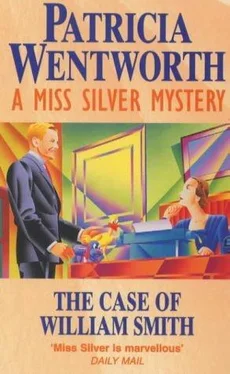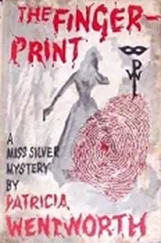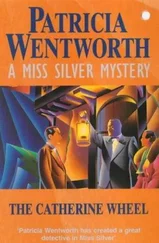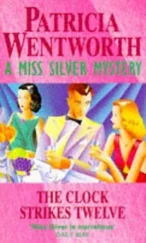Patricia Wentworth - The Case of William Smith
Здесь есть возможность читать онлайн «Patricia Wentworth - The Case of William Smith» весь текст электронной книги совершенно бесплатно (целиком полную версию без сокращений). В некоторых случаях можно слушать аудио, скачать через торрент в формате fb2 и присутствует краткое содержание. Жанр: Детектив, на английском языке. Описание произведения, (предисловие) а так же отзывы посетителей доступны на портале библиотеки ЛибКат.
- Название:The Case of William Smith
- Автор:
- Жанр:
- Год:неизвестен
- ISBN:нет данных
- Рейтинг книги:4 / 5. Голосов: 1
-
Избранное:Добавить в избранное
- Отзывы:
-
Ваша оценка:
- 80
- 1
- 2
- 3
- 4
- 5
The Case of William Smith: краткое содержание, описание и аннотация
Предлагаем к чтению аннотацию, описание, краткое содержание или предисловие (зависит от того, что написал сам автор книги «The Case of William Smith»). Если вы не нашли необходимую информацию о книге — напишите в комментариях, мы постараемся отыскать её.
The Case of William Smith — читать онлайн бесплатно полную книгу (весь текст) целиком
Ниже представлен текст книги, разбитый по страницам. Система сохранения места последней прочитанной страницы, позволяет с удобством читать онлайн бесплатно книгу «The Case of William Smith», без необходимости каждый раз заново искать на чём Вы остановились. Поставьте закладку, и сможете в любой момент перейти на страницу, на которой закончили чтение.
Интервал:
Закладка:
The immemorial words of the marriage service sounded in the echoing space and trembled away into silence – ‘I require and charge you both, as ye shall answer at the dreadful day of judgment when the secrets of all hearts shall be disclosed, that if either of you know of any impediment, why ye may not be lawfully joined together in Matrimony, ye do now confess it…’ The silence seemed to echo too.
Katharine lifted her head and looked up into the reds and blues of a stained-glass window where Christ turned the water into wine.
Now the old betrothal service followed, and the vows ‘to have and to hold from this day forward, for better for worse, for richer for poorer, in sickness and in health, to love and to cherish, till death us do part…’ William’s voice quite steady, quite sure of what he was promising. Then her own, rather soft – ‘to love, cherish, and to obey, till death us do part according to God’s holy ordinance.
William putting the ring on her finger – ‘with my body I thee worship…’
And the prayer, the joining of hands, and – ‘those whom God hath joined together let no man put asunder… ’
The young man who took the service had a pleasant voice. It came out strong and full when he pronounced them man and wife and blessed them.
Mrs. Bastable sniffed and dried her eyes. Weddings always made her cry. Abigail Salt sat up very straight in a black coat with a fur collar. Because it was a wedding she had put an unseasonable bunch of cornflowers in her hat. They made her eyes look very blue.
In the vestry Katharine signed her name and looked at it and smiled a little, and stood aside for William to sign too. He wrote his William Smith.
The young parson stopped him as he was turning away.
‘Your father’s name too, Mr. Smith.’
‘I’m afraid I don’t know it.’
William was quite simple and unembarrassed. It was the parson who coloured.
‘I’m afraid – ’ he began, and stopped.
‘You see, I’ve lost my memory. I can put blank Smith if you like.’
Well, of course, it wasn’t what he liked or didn’t like. He really didn’t know. He would have to tell the Vicar. After all, if a man didn’t know his father’s name he didn’t.
William wrote Smith with a dash in front of it on the register. And then the young parson called Katharine back.
‘You have to give your father’s name too, Mrs. Smith.’
Still with that small faint smile, Katharine leaned over and wrote. Then she turned round to be congratulated by Mrs. Bastable.
‘I’m sure I hope you’ll be happy, Mrs. Smith. And I’m sure Mr. Smith is one that anyone could be happy with. Believe it or not, I don’t know that I’ve ever seen him out of temper, and when you think how most men are – well, it’s bound to make a difference, isn’t it? Mr. Bastable had a very hasty temper. And particular about his food – well you’d hardly believe it. Always talking about his mother’s cooking too, and if there’s anything more likely to make unpleasantness in the home, well, I don’t know what it is. I’ve always been considered sweet-tempered myself, but when he used to look at my scones and say how much lighter his mother made them, it used to come up on the tip of my tongue to say, “Then why didn’t you stay home with her?” But I never said it. I don’t know what he might have done if I had – being so hasty you know.’ She dabbed her eyes and sniffed again. ‘Oh, well, we must let bygones be bygones, mustn’t we? And Mr. Bastable’s been gone getting on for twenty years.’
Abigail Salt had much fewer words. She said, ‘I hope you will be very happy, and Mr. Tattlecombe hopes so too.’
Chapter Seventeen
That same evening Frank Abbott dropped in on Miss Maud Silver at her flat at Montague Mansions. Whatever happened in the outer world, here time stood still. But not in any sluggish, lotus-eating manner – ‘Oh dear, no,’ as Miss Silver herself might have said. He found in her a constant stimulus to thought, and whilst her idiosyncrasies were a continual entertainment, he did actually and in sober truth revere the little woman who, beginning her working life in what she herself termed the private side of the scholastic profession, was now a much sought-after enquiry agent.
Where time had been halted was on the threshold of this room. The furniture inherited from more than one great-aunt was of the type strangely popular in the sixties of the previous century. The chairs, with their walnut frames, bow legs, and spreading upholstered laps, suggested long-departed crinolines and peg-top trousers. Engravings of famous Victorian pictures in yellow maple frames looked down upon a carpet not of contemporary age but of a truly contemporary pattern. The pictures, interchanged from time to time with those in her bedroom, included the late Sir John Millais’ Bubbles, Mr. G. F. Watts’ Hope, together with The Stag at Bay and The Soul’s Awakening. The carpet, new a year ago, was of a lively shade of peacock-blue, with a pattern of pink and white roses in wreaths caught together with bows of green ribbon. The curtains, of the same blue but duller in tone, had survived the war, and though not actually shabby were due to be replaced as soon as Miss Silver felt justified in spending so much money upon herself. Two of her niece Ethel Burkett’s boys were now at school, and a baby girl had been added to the family during the past year. School outfits were expensive, and much as the Burketts rejoiced over having a daughter after three boys in succession, the year had placed a considerable strain on their finances, and it was not in Miss Silver’s nature to allow them to bear it unaided. The curtains could very well do another year, or even two.
As she sat in her comfortable chair beside her comfortable fire, her heart was full of gratitude. She had lived for twenty years in other people’s houses, and had expected to live twenty more before retiring on a pittance. The hand of Providence had, however, translated her into a new profession, and to circumstances of modest comfort. The mantelshelf, the bookcase, two occasional tables, and a whatnot were crowded with photographs of grateful clients incredibly framed in fretwork, in hammered or patterned silver, in silver filigree upon plush. A good many of them were photographs of young men and girls, and of the babies who would never have been born if this little old maid had not brought her intelligence and skill to bear upon their parents’ problems.
Frank Abbott was received very much as if he had been a nephew. He accepted the cup of coffee brought him by Emma Meadows, Miss Silver’s valued housekeeper, and sat back sipping it and feeling pleasantly at home. On the other side of the hearth Miss Silver was knitting a pair of infant’s leggings in pale blue wool. After completing three pairs of stockings each for Johnny, Derek and Roger, she was now equipping little Josephine for the coming spring – so treacherous and changeable. With four children to make and mend for, to say nothing of her husband and all the household work, Ethel really had no time for knitting.
There was a pleasant silence in the room. A coal fell in the fire. Miss Silver’s needles clicked above the pale blue wool. Frank finished his coffee and leaned sideways to put down the cup. Then he said,
‘How did you find out that the way to make people talk is to sit there knitting and make them feel everything is as safe as houses and it doesn’t matter what they say?’
A faint smile just touched her lips. She went on knitting.
He laughed.
‘You know, I’ve been here hundreds of times and it’s only just come to me that the thing you conjure with is security. That’s what you’re putting across. Your pictures, your furniture – they’ve come down from a settled past. They belong to the time when there practically wasn’t an income tax and European wars were just something you read about in The Times. There’s all that – and then the one practical modern touch, your office table. That makes them feel that the security doesn’t just exist in the past – it can be brought up to date and put to work for them.’
Читать дальшеИнтервал:
Закладка:
Похожие книги на «The Case of William Smith»
Представляем Вашему вниманию похожие книги на «The Case of William Smith» списком для выбора. Мы отобрали схожую по названию и смыслу литературу в надежде предоставить читателям больше вариантов отыскать новые, интересные, ещё непрочитанные произведения.
Обсуждение, отзывы о книге «The Case of William Smith» и просто собственные мнения читателей. Оставьте ваши комментарии, напишите, что Вы думаете о произведении, его смысле или главных героях. Укажите что конкретно понравилось, а что нет, и почему Вы так считаете.












